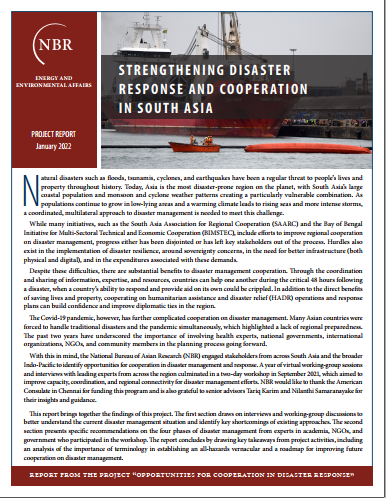Strengthening Disaster Response and Cooperation in South Asia

Natural disasters such as floods, tsunamis, cyclones, and earthquakes have been a regular threat to people’s lives and property throughout history. Today, Asia is the most disaster-prone region on the planet, with South Asia’s large coastal population and monsoon and cyclone weather patterns creating a particularly vulnerable combination. As populations continue to grow in low-lying areas and a warming climate leads to rising seas and more intense storms, a coordinated, multilateral approach to disaster management is needed to meet this challenge.
While many initiatives, such as the South Asia Association for Regional Cooperation (SAARC) and the Bay of Bengal Initiative for Multi-Sectoral Technical and Economic Cooperation (BIMSTEC), include efforts to improve regional cooperation on disaster management, progress either has been disjointed or has left key stakeholders out of the process. Hurdles also exist in the implementation of disaster resilience, around sovereignty concerns, in the need for better infrastructure (both physical and digital), and in the expenditures associated with these demands.
Despite these difficulties, there are substantial benefits to disaster management cooperation. Through the coordination and sharing of information, expertise, and resources, countries can help one another during the critical 48 hours following a disaster, when a country’s ability to respond and provide aid on its own could be crippled. In addition to the direct benefits of saving lives and property, cooperating on humanitarian assistance and disaster relief (HADR) operations and response plans can build confidence and improve diplomatic ties in the region.
The Covid-19 pandemic, however, has further complicated cooperation on disaster management. Many Asian countries were forced to handle traditional disasters and the pandemic simultaneously, which highlighted a lack of regional preparedness. The past two years have underscored the importance of involving health experts, national governments, international organizations, NGOs, and community members in the planning process going forward.
- Publication date : 21st January, 2022
- Publisher: Nontraditional Security Challenges in South Asia
- Website: https://www.nbr.org/
- Author(s): The Energy and Environmental Affairs group of the NBR project Download

